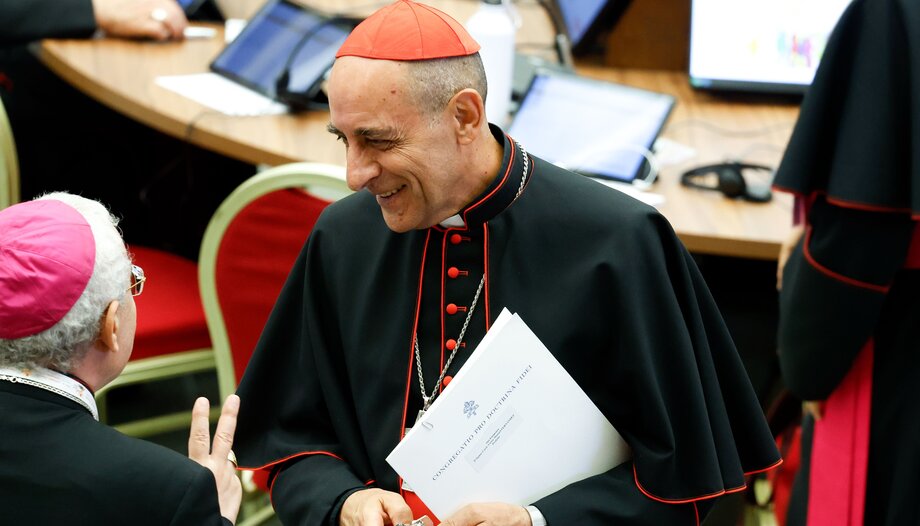The communication of Cardinal Victor M. Fernandez, made public at the usual briefing with the media at the end of Monday morning, and subsequently delivered to journalists at the Press Room The Vatican, he adds that "the study commission on the subject has reached partial conclusions, which we will publish in due course, but will continue to work" on the matter.
The subject belongs to Group 5, of the ten groups established by the Roman Pontiff to study certain questions, in a Letter sent by the Pope to Cardinal Mario Grech on March 14 of this year.
"Theological and canonical issues in ministerial forms".
Specifically, the question entrusted to the Group was the following: "5. Some theological and canonical questions regarding specific ministerial forms".
Cardinal Fernandez explained that this group "is coordinated by the Doctrinal Secretary of the Dicastery for the Doctrine of the Faith. Last Friday he underwent a medical intervention and they proposed in his place two people very capable of listening to the proposals. Then I learned that some people were expecting my presence and I offered a meeting on Thursday at 4.30 p.m.".
Concern for the role of women in the Church
"Instead," the cardinal continues, "the Holy Father is very concerned about the role of women in the Church and, even before the request of the Synod, he asked the Dicastery for the Doctrine of the Faith to explore the possibilities of development without focusing on holy orders. We cannot work in a different direction, but I must say that I fully agree.Why?"
"Because thinking about the diaconate for a few women does not solve the question of the millions of women in the Church," he adds. "On the other hand, we have not yet taken some steps that we could take," he continues.
Some examples
"1) When the new ministry of the catechist was created, the Dicastery for Divine Worship sent a letter to the Episcopal Conferences. In it, it proposed two different ways of configuring the ministry. One was related to the direction of catechesis. But the second one took up what the Pope said in Dear Amazonia about catechists who support communities in the absence of priests, women who are in charge, lead communities and perform different functions".
"The Episcopal Conferences could accommodate this second way, but very few have done so. This proposal was possible because the Pope had explained in his documents that priestly power linked to the sacraments is not necessarily expressed as power or authority, and that there are forms of authority that do not require Holy Orders. But these texts have not been accepted".
Women deacons are not the most important thing to promote them.
"2) The acolyte for women has in fact been granted in a small percentage in the dioceses, and many times it is the priests who do not want to present women to the bishop for this ministry," he points out in the document.
"These few examples," in the cardinal's judgment, "make us see that rushing to call for the ordination of women deacons is not today the most important response to promote women."
To encourage reflection, Cardinal Fernandez "asked that testimonies of women who lead communities or carry out important functions of authority be sent to my Dicastery. Not because they have imposed themselves on the communities, or as a result of a study, but because they have acquired this authority under the impulse of the Spirit in response to a need of the people".
"I especially ask the women members of this Synod to help take up, make explicit and send to the Dicastery various proposals, which we can hear in their context, on possible avenues for the participation of women in the leadership of the Church. In this line we expect proposals and reflections".
"For those who were very concerned about the procedures and the names, on Thursday I will explain it and give the names, to associate some faces to this work," he added.
The commission will continue to be active
"Notwithstanding the above, for those who are convinced on the subject of the female diaconate, the Holy Father has confirmed to me that the Commission will remain active under the chairmanship of Cardinal Giuseppe Petrocchi," added the Prefect.
"Members of the Synod who wish to do so - either individually or as groups - can send considerations, proposals, articles or concerns on this topic to that Commission. Cardinal Petrocchi confirmed to me that the work will resume in the coming months and will analyze the materials that have arrived."
Cardinal Giuseppe Petrocchi has been archbishop of L'Aquila (Italy) since 2013, and was created a cardinal by Pope Francis in 2018.
A la Carte Support
Nathalie Becquart (Fontainebleau, Paris, FranceThe French nun and undersecretary of the Synod, who supported the letter, said in response to numerous questions from journalists on the issue of the female diaconate that "nothing prevents women from playing important roles in the Church". And in another moment, she pointed out: "I am a woman, we must not confuse the role of women in the Church with wanting to clericalize them", as did Cardinal-elect Fr. Timothy Radcliffe, who warned against the intention of seeking "headlines" in the draft of the final document, which is already before the Synod Assembly as of this afternoon.









